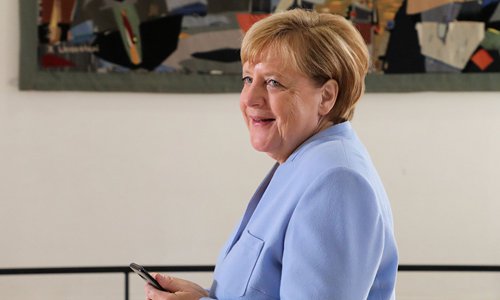HOME >> CHINA
Merkel visit expected to deliver fruits
By Li Ruohan Source:Global Times Published: 2019/9/2 23:43:40
Welcome, appreciation expressed to chancellor

German Chancellor Angela Merkel Photo:VCG
German Chancellor Angela Merkel is expected to pay an official visit to China from Friday to Saturday, her 12th trip since taking office in 2005.
The German leader's visit to China comes at the invitation of Chinese Premier Li Keqiang, Foreign Ministry spokesperson Geng Shuang said at a daily briefing on Monday.
Chinese analysts suggested that as the trip is being made days before China celebrates the 70th anniversary of founding of the People's Republic of China on October 1, the visit underscores the top European politician's acknowledgement of China's development path and the significance of China-Germany relations.
Merkel is regarded among ordinary Chinese an accessible leader with impressive academic achievements who likes Chinese food.
In her previous visit to Chinese cities, the chancellor played with a kongzhu, a kind of traditional Chinese yo-yo. She also watched the ballet Romeo and Juliet and tried out kungpao chicken and steamed dumplings.
Wide expectations
The visit comes at a time when the global economic growth is threatened by US unilateralism and the international financial markets are rattled by US-launched trade wars against countries including China.
Berlin has always distanced itself from US President Donald Trump's sarcastic attacks on Beijing, Alawi Shaaban Swabury, the founder and CEO of ESSB KG, a Berlin-based business consulting company, told the Global Times.
Germany and China are on the same page to defend globalized trade and multilateralism, Swabury said.
Zhang Shengjun, an international politics professor at Beijing Normal University, noted that the interaction between China and Germany is necessary to pool more consensuses to address unilateralism and improve global governance.
Liang Xin, a bachelor's degree student at Dresden University of Technology in Germany, told the Global Times on Monday that he expects Merkel's trip to bring more Chinese experience, capital, talent and technology to Germany and so strengthen and diversify the country's social development.
Liang, who has been studying in Dresden since 2014, said that Germany's modern lifestyle has not changed much technologically, but dramatic changes have been happening in Chinese cities, such as with e-payment and online social services.
The innovative society China promotes can also be a stage for German youth, who could play a bigger role by combining their skills and studies with China's market, Liang believed.
For Wang Zhushan, a graduate of Bielefeld University in Germany who works at the Beijing-based Global Finance Magazine, Merkel's visits can deliver more diverse cooperation between the two countries.
China could be more than just a major trading partner for Germany, Wang said.
China-Germany exchanges in art, health and medicine are much fewer than those between China and France, while in education, it's still difficult for Chinese high school students to apply to German colleges, she said.
According to a schedule release on the website of the German government, after meeting Chinese leaders on Friday, Merkel will fly to Wuhan, capital of Central China's Hubei Province.
She will meet university students in Wuhan and visit the German-Chinese Friendship Hospital in the city.
Merkel's visit to a university shows her profound understanding of the role of the younger generation in promoting China-Germany relations and could be one of her great legacies as chancellor, Swabury told the Global Times.
But Wang noted that Germany's stance on secessionists from Hong Kong, Tibet, Xinjiang and Taiwan also challenged bilateral relations.
Chinese observers will be watching whether Merkel raises Hong Kong, a topic that has been repeatedly exploited by Western countries, such as the UK, to interfere in China's internal affairs.
Merkel is unlikely to avoid Hong Kong, but she is also a Western politician who knows China's bottom line on political issues, Zhang, the Beijing university professor, told the Global Times on Monday.
China and Germany share a consensus to promote stability and prosperity in Hong Kong that accommodates international business activities, and both sides could have frank and practical discussion on this point, he noted.
Merkel's visit comes as some European countries are embracing the China-proposed Belt and Road Initiative (BRI) while others seek to maintain a tougher European front toward China.
In truth, the front has always looked fragile, according to an article headlined "Is Germany Going Soft on China?" published online Saturday by the Atlantic Council, a Washington-based think tank.
Italy became the first Group of Seven (G7) country to sign up to BRI in March 2019 and countries like Hungary, Greece and Portugal continue to welcome Chinese investments in their rail infrastructure, ports and energy networks, Berlin-based journalist Noah Barkin noted in the article.
Meanwhile, post-Brexit Britain will be reluctant to take any steps that threaten its economic relationship with China and new British Prime Minister Boris Johnson has described himself as "very enthusiastic" about BRI, the article said.
Zhang said that Germany's strong economic foundation can support a wide range of cooperation under BRI, while the platform, a fruitful global public product that embraces multilateralism, could also bring a greater economic outlook to Germany.
Practical actions from the German side, such as signing agreements or launching cooperative projects related to the BRI, could also be a big gift to celebrate the 70th birthday of the People's Republic of China in October, said Zhang.
RELATED ARTICLES:
Posted in: DIPLOMACY